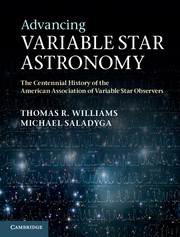 Advancing Variable Star Astronomy
Advancing Variable Star Astronomy Book contents
- Frontmatter
- Contents
- Foreword
- Preface
- Acknowledgments
- PART I PIONEERS IN VARIABLE STAR ASTRONOMY PRIOR TO 1909
- PART II THE FOUNDING OF THE AAVSO – THE WILLIAM TYLER OLCOTT ERA
- PART III RECORDING AND CLASSIFICATION – THE LEON CAMPBELL ERA
- PART IV THE SERVICE BUREAU – THE MARGARET MAYALL ERA
- 10 Learning about independence
- 11 Eviction from Harvard College Observatory
- 12 Actions and reactions
- 13 In search of a home
- 14 Survival on Brattle Street
- 15 AAVSO achievements
- 16 Breathing room on Concord Avenue
- PART V ANALYSIS AND SCIENCE – THE JANET MATTEI ERA
- PART VI ACCELERATING OBSERVATIONAL SCIENCE – THE ARNE HENDEN ERA
- Appendix A AAVSO historiographic notes
- Appendix B Top AAVSO observer totals
- Appendix C Variable star observing groups represented in the AAVSO International Database
- Appendix D AAVSO Awards
- Appendix E Officers of the AAVSO
- Appendix F AAVSO Council members
- Appendix G AAVSO Scientific committee, section, division, and program chairs
- Notes
- Bibliography
- Index
12 - Actions and reactions
from PART IV - THE SERVICE BUREAU – THE MARGARET MAYALL ERA
Published online by Cambridge University Press: 13 June 2011
- Frontmatter
- Contents
- Foreword
- Preface
- Acknowledgments
- PART I PIONEERS IN VARIABLE STAR ASTRONOMY PRIOR TO 1909
- PART II THE FOUNDING OF THE AAVSO – THE WILLIAM TYLER OLCOTT ERA
- PART III RECORDING AND CLASSIFICATION – THE LEON CAMPBELL ERA
- PART IV THE SERVICE BUREAU – THE MARGARET MAYALL ERA
- 10 Learning about independence
- 11 Eviction from Harvard College Observatory
- 12 Actions and reactions
- 13 In search of a home
- 14 Survival on Brattle Street
- 15 AAVSO achievements
- 16 Breathing room on Concord Avenue
- PART V ANALYSIS AND SCIENCE – THE JANET MATTEI ERA
- PART VI ACCELERATING OBSERVATIONAL SCIENCE – THE ARNE HENDEN ERA
- Appendix A AAVSO historiographic notes
- Appendix B Top AAVSO observer totals
- Appendix C Variable star observing groups represented in the AAVSO International Database
- Appendix D AAVSO Awards
- Appendix E Officers of the AAVSO
- Appendix F AAVSO Council members
- Appendix G AAVSO Scientific committee, section, division, and program chairs
- Notes
- Bibliography
- Index
Summary
It made me nearly sick to think our beloved organization is endangered.
– Richard W. Hamilton, 1953With the information that Harvard College Observatory would not be supporting AAVSO operations in the future, Margaret Mayall now had a clear idea of what needed to be done once the AAVSO Council and Evaluation Committee were notified.
There were critical steps to be taken by the AAVSO leadership: a short-term effort to raise operating funds and a long-term endowment fundraising effort. The AAVSO membership would have to be notified and reassured of the continuity of the Association and of the value of its work.
Secondary to this was contemplation of what to do about the HCO report itself: Mayall would make an appeal to the Harvard administration and obtain legal advice concerning the possibility of recovering part, or all, of the rescinded Pickering Memorial Endowment. At the same time, arrangements for the spring meeting in Ann Arbor, just 4 weeks away, were not yet final.
These were just a few of the steps that Mayall, the second Pickering Memorial Astronomer, would take to refute Harvard's actions and attempt a recovery of the Pickering Memorial Endowment. She and the AAVSO would fight back, an action that was totally unexpected by the HCO and Donald Menzel, its newly appointed director. These events are covered in this chapter.
- Type
- Chapter
- Information
- Advancing Variable Star AstronomyThe Centennial History of the American Association of Variable Star Observers, pp. 171 - 183Publisher: Cambridge University PressPrint publication year: 2011


